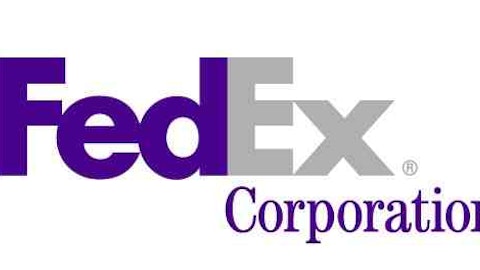What makes Realty Income Corp (NYSE:O) so unique is the quality of its tenant portfolio. Many of Realty Income Corp (NYSE:O)’s peers offer a tenant portfolio with a much higher number of below-investment-grade renters. Think, for instance, about its peers that rent to chain stores like OfficeMax, which is closing stores, or Borders Group, which liquidated. By contrast, Realty Income Corp (NYSE:O)’s portfolio is predominantly made up of investment-grade companies, and more than 55% of its leases are for the long term, with expirations in 2023 or beyond.
With a monthly dividend that currently pays out 5% annually and a tenant portfolio that’s about as close to perfect as any investor could hope for, this might be among the best investments across the REIT space. Bet against this stock? No way!
What can brown do for you?
When it comes to shipping a package, there aren’t too many options to choose from, which immediately places United Parcel Service, Inc. (NYSE:UPS), or UPS, and rival FedEx Corporation (NYSE:FDX) in a clearly advantageous position with regard to pricing power. Both logistics companies are well aware that consumers have few shipping choices, so it saves these two foes from getting into a pricing war.
But external growth factors overseas have become both the boon and bane of shippers like UPS and FedEx Corporation (NYSE:FDX). Austerity measures throughout most of Europe have reduced government spending and trickled down to businesses and European consumers, who are doing everything they can to save money. What this has meant for FedEx is lower priority overnight shipping despite higher international shipping volume. The same can be said for United Parcel Service, Inc. (NYSE:UPS), which saw international package volume rise 5%, but saw a 3.4% decline in higher-margin, next-day services. This trade-down effect has been a savior in that it hasn’t cut off demand completely, but it’s made boosting the bottom line difficult without the aid of cost-cutting and share repurchases.
Ultimately, the question is whether or not short-sellers should be betting against UPS. The answer, I believe, is a definitive “maybe.” UPS’ cash flow, international package volume increases, ability to cut costs, and impressive dividend are all reasons that pessimists have no business betting against UPS. Then again, its highest-margin business segment is suffering, and its business is intricately tied to the state of the global economy, which still remains shaky at best.
Foolish roundup
This week’s reminder is that you’re just not going to understand all investors all the time. Why pessimists would bet against a company being purchased at a higher price than its current value in cash, or assume a commercial REIT with a rising monthly dividend and a predominantly investment-grade portfolio of tenants with a 98.2% occupancy rate is going to head lower, is beyond me. Then again, whereas UPS might appear a no-brainer buy, short-sellers have raised some eyebrows recently where only optimism had existed previously.
The article Shorts Are Piling Into These Stocks. Should You Be Worried? originally appeared on Fool.com and is written by Sean Williams.
Fool contributor Sean Williams has no material interest in any companies mentioned in this article. You can follow him on CAPS under the screen name TMFUltraLong, track every pick he makes under the screen name TrackUltraLong, and check him out on Twitter, where he goes by the handle @TMFUltraLong.The Motley Fool recommends FedEx and United Parcel Service.
Copyright © 1995 – 2013 The Motley Fool, LLC. All rights reserved. The Motley Fool has a disclosure policy.




